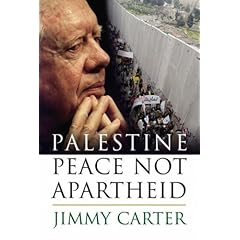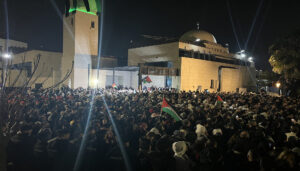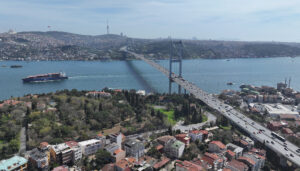Palestine; Peace not Apartheid
By Jimmy Carter
Former US president Jimmy Carter sets out to overcome the existing restraints on “any debate critical of Israel in the US,†as he puts it, and to present facts about the Palestinian-Israeli conflict unknown to an American audience. Yet, given the fact that this latest book has been largely ignored by the mainstream media in the US, one would doubt whether he came close to achieving that purpose.
Having been the key architect of the Camp David Accords that brought about a peace treaty between Egypt and Israel in 1978, and remaining closely involved in the issues of the conflict after his term of presidency, Carter attempts to give an overview of the situation and identify the reasons for the stalemate in the peace negotiations. He places the bulk of the blame on Israel’s control and colonization of Palestinian land, and its perpetuation of the occupation by depriving the Palestinians in the West Bank and Gaza of “basic human rights.†He also points out that the US blockage of UN resolutions critical of Israel, and the lack of persistent effort on its part to resolve the Palestinian issue is “a major source of anti-American sentiment and terrorist activity throughout the Middle East and the Islamic world.â€
For the Arab reader, the book has little insight to offer, and its value probably stems from the fact that it is quite shocking for such statements to come from a former American president. Carter’s interest in the region began while he was governor of Georgia before becoming president, and continued afterwards, through personal visits, as well as the work of the Carter Center – an NGO he founded to promote health, democracy, and human rights – which monitored the Palestinian elections in 1996, 2005, and 2006. He draws upon personal encounters, discussions, and observations, but historical accounts in the book are rather shallow, at times overlooking major developments in the region that cross-link and affect the conflict.
Carter has been accused of bias against Israel, and of being Anti-Semitic, particularly for his use of the word “Apartheid†to describe Israeli policy in the West Bank and Gaza. In January this year, fourteen members of the advisory board of the Carter Center resigned in the latest series of escalating controversies over the book. Carter did not comment on the resignations, but said that he intended for the book to be provocative. “If it provokes debate and assessment and disputes and arguments and maybe some action in the Middle East to get the peace process, which is now completely absent or dormant, rejuvenated, and brings peace ultimately to Israel, that’s what I want,” he said previously on NBC’s “Meet the Press.”

Kalimat by Lina Ejeilat. Lina graduated from University of Jordan in electrical engineering and is currently a journalist in Amman.











